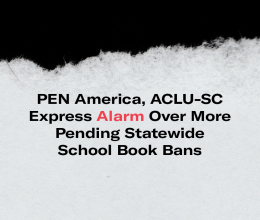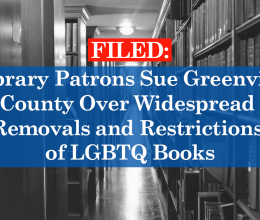
COLUMBIA – The American Civil Liberties Union of South Carolina has filed a federal lawsuit asking the court to remove a shroud of secrecy around South Carolina’s death penalty.
The new federal lawsuit challenges the constitutionality of the 2023 secrecy statute that forbids the publication of information about the procurement of lethal injection drugs, among other key information regarding the death penalty.
The lawsuit argues that the law bars public access to “a vast swath of information” — both current and historical — “related to execution-related drugs and/or equipment, including procurement; repairs and maintenance done after acquiring the drugs or equipment; protocols; risk mitigation measures; compliance with state and federal regulations; and cost.”
“Anti-death penalty advocates succeeded in persuading drug manufacturers and suppliers that their products shouldn’t be used in executions. Instead of engaging in the debate, South Carolina silenced those disfavored voices. That content- and viewpoint-based censorship violates the First Amendment,” said Meredith McPhail, Staff Attorney for the ACLU of South Carolina.
The legal team is also asking the court to issue a preliminary injunction, allowing the ACLU-SC to publish information about the death penalty that is currently censored by the Secrecy Statute. The named defendants are State Attorney General Alan Wilson and S.C. Department of Corrections Director Bryan Stirling.
Today’s legal complaint traces the history of executions in South Carolina, from public hangings in broad daylight to the cloistered proceedings of today's death chamber. Currently, the state offers condemned people the choice of being electrocuted, poisoned with lethal injection, or shot through the chest by a firing squad. No matter the method, the state now executes people in the evening in a small chamber at the Broad River Correctional Institution in Columbia.
Key elements of all three execution methods are now shrouded in secrecy under 2023’s Senate Bill 120, incorporated in S.C. Code of Laws Section 24-3-580.
South Carolina lawmakers began considering a death penalty secrecy statute after major pharmaceutical companies began refusing to sell drugs to U.S. states for the purpose of lethal injection. With the source of those drugs eliminated, South Carolina resorted to desperate measures. In 2010, it was revealed that South Carolina ordered sodium thiopental from a company operating out of a non-medical facility in England.
Eager to resume killing South Carolinians on Death Row, Gov. Henry McMaster and others promoted Senate Bill 120 as a way to hide the identity of compounding pharmacies or other companies willing to supply execution drugs and equipment to the state’s government. In his 2023 State of the State Address, McMaster emphasized that the purpose of the secrecy statute was to shield drugmakers’ identities “from anti-death penalty activists.” Backers of the bill added a criminal penalty to the statute to deter whistleblowers. Lawmakers passed the bill despite evidence that similar laws in other states had contributed to botched executions and failures of public oversight.
Today’s lawsuit argues that the South Carolina law chills political speech. Rather than persuade the public and pharmaceutical companies that it is moral to purchase poison for the purpose of executing South Carolinians, leading politicians have instead sought to suppress speech that they find inconvenient. To quote from today’s complaint:
“This ban not only further departs from the state’s history of making execution-related information publicly available but criminalizes the disclosure of this information by anyone for any reason. It thus silences the scientists, doctors, journalists, former correctional officials, lawyers, and citizens who have scrutinized the safety, efficacy, morality, and legality of South Carolina’s use of lethal injection.
“That approach is repugnant to the First Amendment. The Secrecy Statute serves an impermissible goal—to silence disfavored speech—by facially discriminating against speech based on its viewpoint and content and restricting the public’s right of access to information. The First Amendment permits none of that.”
In a separate case, ACLU-SC v. Stirling, the ACLU of South Carolina is challenging another element of South Carolina’s death penalty secrecy: The Department of Corrections’ all-out prohibition on news media interviews with incarcerated people. The ACLU-SC filed a petition for rehearing on December 27, highlighting the case of Marion Bowman Jr., whom the state is set to execute on January 31.







